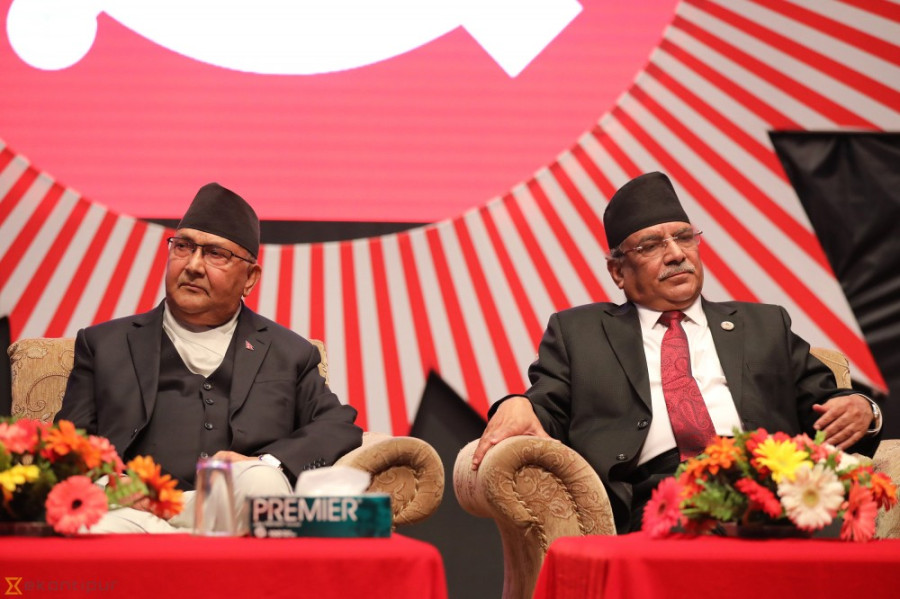National
Game of one-upmanship begins in ruling party as power play intensifies
Insiders say Dahal is in a bid to accumulate strength to put pressure on Oli
Tika R Pradhan
When two leaders of the ruling Nepal Communist Party—Pushpa Kamal Dahal And Ishwor Pokhrel—sparred over ideological issues at a public function last week, many saw it as the beginning of a debate that is likely to heat up over the political line the unified party will follow.
But party insiders say the ideological deliberations on Wednesday were also an indication of the beginning of a power struggle within the governing party.
“Dahal has started courting support among the traditional groups of the former CPN-UML, including the one led by Madhav Kumar Nepal,” said Surya Thapa, a central committee member close to Pokhrel. “Dahal wants to build pressure on [KP Sharma] Oli. Pokhrel’s statement last week over ideological issues was aimed at Dahal’s move.”
Last year, while announcing the party unification, Oli and Dahal called themselves “co-pilots”.
The party has the mandate to run the government for a full five-year term, but there was an understanding between Oli and Dahal to take turns to be at the helm.
Party leaders say Dahal seems to have sensed that the understanding may not get implemented. Hence, he is engaged in soliciting support from the groups within the party, which are not happy with Oli and his ways.
When Pokhrel, a secretariat member, used a programme organised to mark the 29th establishment day of the youth wing of the Nepal Communist Party (NCP) to question the leadership about the party ideology, Dahal in response said that had the leaders continued debating ideological issues, unification would not have happened.
“If his prospects of sharing resources are threatened, Dahal has to find a way to fight back,” a member close to Dahal told the Post on condition of anonymity because he feared retribution. “And one way to build pressure on Oli whenever it suits Dahal is keeping the issue of ideological differences alive.”
Though the unified party has decided to settle its party line through the unity national convention, scheduled for May next year, the former UML and former Maoist parties continue to share the differences.
Former UML members want to continue with the People’s Multi-party Democracy, while the former Maoists have been making a pitch for their 21st-century People’s Democracy.
And a large section of the former UML has refused to own “People’s War”, an insurgency waged by the Maoists that lasted 10 years and claimed nearly 17,000 lives.
Another party leader close to Dahal claimed that unification of the two communist parties was just a “marriage of convenience” aimed at grabbing state resources and that ideology is not on both the leaders’ agenda.
In internal meetings, senior leaders have time and again questioned the motive of the unification without having a clear ideological basis.
All the party leaders and cadres are well aware of the understanding between Oli and Dahal to share the prime minister’s position—tentatively after two and a half years.
“With the Oli-led government already 15 months old, Dahal now wants to start building pressure on the other co-chair,” the leader close to Dahal said.
Oli and Dahal may have created a behemoth of an outfit, but factionalism is rife in the party and it allows ample room to play.
Oli and Madhav Nepal are old adversaries. Nepal had vehemently stood against the process to select leadership of the party’s district committees. But when his faction was given ample space, he decided to yield.
Bishnu Rijal, a central member close to Nepal, said Pokhrel on Wednesday was venting his anger because he has reservations over the selection of leaders close to Nepal in the district and other committees.
The merger of district committees was delayed by almost 11 months because the Oli group wanted to cut the Nepal faction to size, leaders say. But it was Dahal who managed to create a situation acceptable to Nepal.
Among the 44 district chairpersons chosen from the former UML, two are said to be neutral, 25 are close to Oli and 17 are from the Nepal faction, which has district secretaries more in number than the Oli faction.
Dilu Panta, a central member, said Dahal’s intimacy with Nepal in recent days has created some unease among leaders close to Oli. “And Pokhrel’s statement targeting Dahal and Nepal must have emanated from that,” said Panta.
Dahal, a two-time prime minister, in recent months has held a series of meetings with various leaders, including Nepal, Jhala Nath Khanal, Bamdev Gautam and Narayan Kaji Shrestha.
One such meeting was held between these leaders in the last week of January, when Oli was in Switzerland, and it had irked the prime minister no end.
Dahal, however, had defended the meeting, saying it intended to find a solution to the ongoing conflict regarding the merger of the lower committees.
“If Dahal cannot make it to Singha Durbar, he would certainly want to become the sole chairman of the unified party,” said Krishna Rai, a central member close to Oli. “It’s not unusual for leaders to make maneuvers to be in power and position.”
Another Secretariat member of the party told the Post that it had become apparent to Dahal that Oli would not make way for Dahal to lead the government in spite of the understanding.
In July 2016 too, Oli had made a U-turn and refused to hand over power to Dahal, which had prompted then Maoist party to pull out of the coalition government. The Maoist party had then sided with the Nepali Congress to form the government.
“Unless Dahal manages to create intense pressure [on Oli], he will be left with no option but to play second fiddle to Oli,” said the Secretariat member. “It’s but an obvious move if Dahal seeks support from among those who would stand by him and help him achieve what he wants."




 16.12°C Kathmandu
16.12°C Kathmandu














